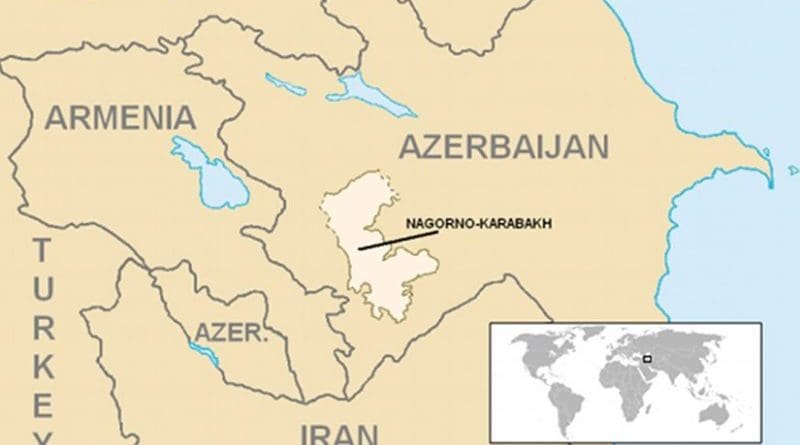Conclusions To Be Drawn From Four-Day fight In Nagorno-Karabakh For Peace Process – Analysis
By JTW
By Azad Garibov*
On April 1, clashes broke out across the line of contact between the Armenian and Azerbaijani armed forces, thus marking some of the heaviest fighting to have occurred over the occupied Azerbaijani region of Nagorno-Karabakh since a ceasefire was agreed upon by the two parties in 1994. The latest clashes ended with a mutually agreed ceasefire on April 5. According to official sources, Azerbaijan lost 31 soldiers in the operations, and though the final number of Armenia’s losses is not yet clear, according to the latest information, over the course of the operations as many as 44 Armenian servicemen were killed, 121 were wounded, and 25 have been confirmed as missing so far. A noteworthy amount of heavy military equipment and weaponry was also lost in the course of the clashes.
The most important question remaining after the four-day fight is: what conclusions can be drawn from the resurgence of violence in terms of the Nagorno-Karabakh peace process? Primarily, the recent escalation of hostilities once again highlighted the apparent need for the international community to increase its efforts to find a lasting resolution to the conflict. For a long time, inaction has characterized the international community’s approach to the issue. Azerbaijan has long criticized the OSCE Minsk Group, which is tasked with finding a peaceful solution to the conflict, for its failure to deliver a long-awaited peace in the region. Apart from the organization of sporadic meetings between the conflicting parties and the issuance of vague statements, there has been little real effort made toward resolving the conflict. In particular, no pressure has been applied on Armenia to conform to the provisions of international law and therewith to adhere to the United Nations’ four Security Council resolutions (822, 853, 874, 884) which demand the unconditional and immediate withdrawal of troops from Nagorno-Karabakh and other occupied regions of Azerbaijan. In such an environment of impunity coupled with the inefficacy of international efforts, Armenia refuses to compromise for the sake of peace and repeatedly sabotages the negotiation process, rendering a resolution to the conflict virtually impossible.
Furthermore, future international efforts should not be narrowly directed at preventing the escalation of hostilities and maintaining the status-quo on the line of contact, as has been the case for a long time; on the contrary, their goal should be to eliminate the root cause of hostilities – they should aim to resolve the Nagorno-Karabakh conflict. So far, international efforts have mainly been directed at freezing the conflict, rather than solving it. The Co-Chairs of the Minsk Group seem to be working within the bounds of “conflict management” – as they try to reduce the tensions between the parties via occasional visits to the region – rather than actually working to establish a conflict resolution mechanism”. The latest clashes once again showed that the current status quo is unsustainable. The two armies, facing each other on the line of contact and sometimes separated by just 200 meters of “no man’s land”, have invested massive amounts of resources in their rearmament over the last 20 years. At any moment a single provocation could occur that can flare tensions and result in severe consequences. Even without such provocations, unintended escalations are quite possible. The conflict can resurge at any time and such unintended escalations may lead to all-out war and destabilize the entire region, creating serious security implications globally. The small, unarmed OSCE monitoring mission that is on the line of contact can in no way guarantee the ceasefire. In fact, aside from the current escalation that caught the eye of the entire world, ceasefire violations have always been quite commonplace along the line of contact. The current escalation caused about 75 confirmed military deaths, but approximately same number of people die every year as a result of ceasefire violations. For example, 73 soldiers (31 Azerbaijani and 42 Armenian) and dozens of civilians on both sides died in skirmishes just in 2015.
Finally, the eruption of heavy fighting along the line of contact in and around the occupied territory of Nagorno-Karabakh should stand as a wakeup call for Armenia and the separatist regime in Nagorno-Karabakh. By having escaped significant damage as a result of the absence of peace, Armenia has demonstrated a rigid position, which has been aimed at prolonging the conflict resolution process in hopes of gradually achieving international recognition of the self-proclaimed “Nagorno-Karabakh Republic”. However, both Armenia and the Nagorno-Karabakh separatist regime should understand that continuation of the status quo is no longer achievable and that there is a price to pay for protraction of the conflict, the sum of which will no doubt culminate in heavy costs. Armenia must change its uncompromising position and engage in genuine peace talks to achieve sustainable peace based on mutual compromise.
The recent escalation of hostilities to near all-out war levels proves that the international community should change its negligent attitude towards the Armenia-Azerbaijan Nagorno-Karabakh conflict. These events, occurring over the course of few days only, blatantly demonstrated that this is not a frozen conflict that can be further neglected, but a dangerous “no war nor peace” situation. Just as Armenia should change its attitude towards the resolution process, the OSCE Minsk Group should cease its inaction and try its best to mobilize international efforts to bring about a long overdue resolution to the conflict. A sustainable solution can only be found within the framework of comprehensive autonomy for Armenian and Azerbaijani communities living together in Nagorno-Karabakh within the territorial integrity of Azerbaijan.

